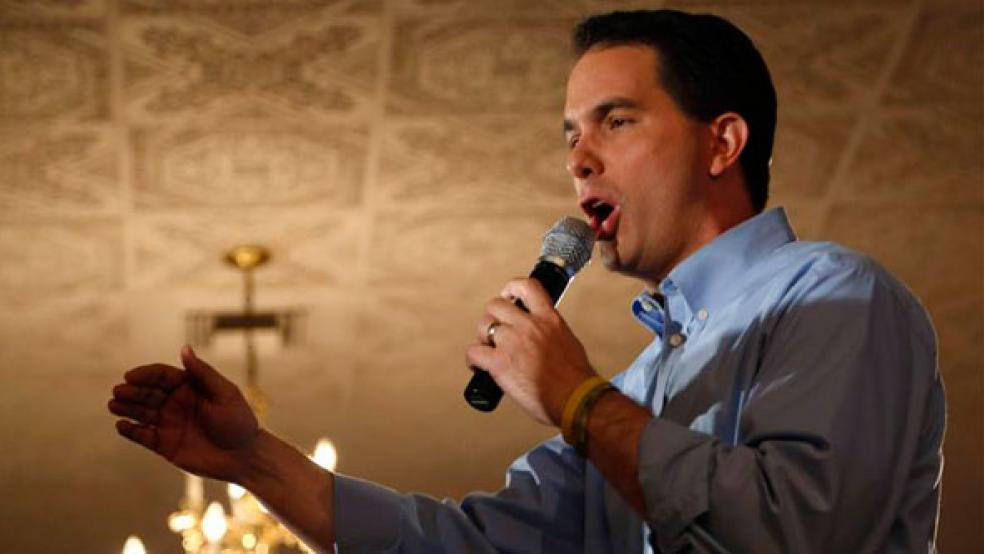When it comes to political corruption, New Jersey and Wisconsin are rarely mentioned in the same sentence. But a raft of emails released by a state appeals court judge Wednesday have Badger State governor Scott Walker facing some of the same questions as his embattled Garden State counterpart, Chris Christie.
Even if Walker is not eventually implicated of any wrongdoing, the documents released Wednesday, as well as other information arising from a pair of criminal cases related to his rise from Milwaukee County Executive to Governor of Wisconsin raise some troubling questions about his choice of personnel and his awareness -- or lack thereof -- of what was going on in his own office.
Related: Chris Christie Paves the Way for Walker in 2016
Much has been written and said about Walker as the Republican reformer who successfully beat back labor unions over collective bargaining in a blue state and handily survived a recall election that positioned him for a possible run for president in 2016. Until now, however, there has been relatively little attention paid – outside Wisconsin – to the criminal conduct of many who surrounded him.
The more than 25,000 pages of e-mails released on Wednesday were gathered as part of a now-concluded investigation that led to conviction of Kelly Rindfleisch, a former Walker deputy chief of staff, on charges that she essentially worked as a campaign staffer for a Republican candidate for lieutenant governor while on the clock in Walker’s office.
The Rindfleisch case has focused on Walker’s time as Milwaukee County executive before his 2010 election as governor, and the emails suggest that numerous county employees worked on Walker’s gubernatorial campaign, using laptops and a portable wireless Internet hotspot to avoid leaving evidence, while being paid by Milwaukee County taxpayers. Walker himself is copied on many of the emails.
Walker has, so far, avoided prosecution in either case, but investigations have uncovered evidence of wrongdoing resulting in multiple felony and misdemeanor convictions of people he appointed to public jobs, and others connected to the governor.
Related: Christie Scandal Opens Door to Right Wing Hopefuls
Kevin Kavanaugh, for instance, whom Walker appointed to serve on the Milwaukee County Veterans Service Commission, was convicted in 2012 of stealing $51,000 in donations earmarked for veterans and their families.
In a similar case, Timothy Russell, a former deputy chief of staff to Walker, was sentenced to two years in prison last year after he was found guilty of stealing $21,000 from a charity intended to benefit wounded veterans and the families of military personnel killed in Iraq and Afghanistan. Walker had placed Russell in charge of the organization.
In a case similar to Rindfleisch’s, Darlene Wink, who was Walker’s director of constituent services, was convicted of a pair of misdemeanors after prosecutors charged her with organizing political fundraisers while on the clock as a county employee.
Related: Walker Burnishes Conservative Cred in State of the State
Finally, William Gardner, a personal friend of Walker’s, was convicted of violating state campaign laws for laundering campaign contributions he made to Walker’s gubernatorial election committee.
The revelations leave Walker facing many of the same problems facing another wounded Republican presidential aspirant, New Jersey Gov. Chris Christie in the “Bridgegate” controversy. Although Christie has insisted he was unaware that two trusted aides in the governor’s office and at the New York-New Jersey Port Authority had conspired to create traffic havoc in Fort Lee as political retribution after that city’s Democratic mayor failed to support Christie for a second term, it seems improbable that he didn’t know something was afoot.
Walker, similarly, is now likely to face questions about how he could have failed to know about illegal activity taking place in his own office – particularly as it was discussed explicitly on emails sent to his personal account.
Top Reads from The Fiscal Times:






